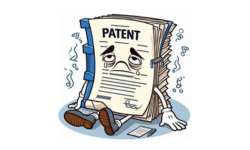Let’s say that you sell patented printer cartridges. Nefarious actors, both inside and outside the U.S., collect your used cartridges, refill your cartridges, and sell your cartridges, now refilled, to U.S. customers. They’re thumbing their noses at your patents. The nerve.
The patent law should protect you, right? After all, the law says that you have the right to “exclude others from making, using, offering for sale, or selling” your patented invention for twenty years and that persons who do so “without authority” from you are liable for patent infringement.
So you set up the bad actors for a fall. You sell the cartridges to customers for a substantial discount, but only after the customers sign a formal contract agreeing not to give the used cartridges to anyone but you. Nefarious actors who acquire those cartridges clearly do so “without authority” from you and hence infringe your patent. Right?
Of course, the nefarious actors immediately give up their evil ways, stop selling refilled cartridges, and open boiler rooms selling cryptocurrency futures and NFTs of ex-presidents.
Just kidding. It’s business as usual for the cartridge refillers. So you file suit for patent infringement. You win at the Federal Circuit Court based on a long line of precedent. You clearly did not authorize the sale by the refillers, so their sales infringed your patent.
Or did they? As you probably surmised, this is an actual case – Impression Products v Lexmark International. In our drama, you’ve been playing the part of Lexmark International, the maker of patented ink cartridges. The nefarious refillers were Impression Products. The Supreme Court concluded that the Federal Circuit Court was wrong and that Impression Products did not infringe Lexmark’s ink cartridge patents because Lexmark’s patent rights were ‘exhausted’ as to each ink cartridge when Lexmark voluntarily sold the cartridge. After the product was sold, all patent rights in the product expired, and the purchaser was entitled to do anything that he or she liked with the product. The Court concluded that any other resolution would be too restrictive on the buying and selling of goods.
But what about the formal contract with the original buyer? Didn’t that prevent patent exhaustion and preserve patent rights? In a word, no. The Supreme Court noted that Lexmark could have sued the original buyers for breach of the contracts, but patent rights are different from contract rights. The existence of a separate and independent contract right did not preserve the Federal patent rights of Lexmark.
But what about the unauthorized importation of goods sold in other countries? Lexmark sold ink cartridges for less money overseas, based on what the market would bear. Wouldn’t the importation of goods sold overseas be unfair to Lexmark? Again, ‘no’ said the Court. The patent owner is entitled to be paid once for its patented product, regardless of where it’s sold. Here Lexmark voluntarily sold the product overseas. Lexmark was paid, and its patent rights then expired due to ‘patent exhaustion.’
The bottom line? Once a product is sold by the patent owner or by someone who has authority to sell the product (such as a license holder), then the product is in commerce and the patent law does not restrict its further sale or use.
— Robert Yarbough, Esq.


